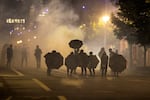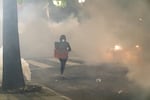Lawmakers in Salem are scheduled to vote Thursday on legislation that civil rights groups said will roll back restrictions they put in place on the use of tear gas and impact munitions less than a year ago.
Restrictions took effect in July 2021 that limited the use of tear gas to declared riots and banned the use of less lethal munitions for crowd control. The legislation, House Bill 2928, was part of a package of police reform bills introduced in the wake of George Floyd’s murder at the hands of Minneapolis police officer Derek Chauvin.
The revised bill, House Bill 4008, would change some of those restrictions by lifting the requirement for a riot declaration and replacing it with a requirement that the weapons’ use is “objectively reasonable” to protect against threats to life, injury or to safely control a dangerous or unlawful situation.

Tear gas fills the air during protests, Friday, Sept. 18, 2020, in Portland, Ore. The protests, which began over the killing of George Floyd, often resulted in frequent clashes between protesters and law enforcement.
PAULA BRONSTEIN / AP
The proposed changes would add other requirements before police can use tear gas, such as attempting de-escalation when possible, announcing the intent to use tear gas and allowing time for people to disperse.
An Oregon Department of Justice analysis of the proposed law argues that the new standard is actually stricter than the previous riot requirement passed in 2021.
Under Oregon law, a riot is six or more people engaging in “tumultuous conduct.” The DOJ analysis said the proposed new “objectively reasonable” standard “provides more protection than the requirement that a riot has been declared, as [a] particular situation must be “objectively dangerous” before the use of tear gas is permitted.”
“I wasn’t interested in rolling back protections,” Rep. Janelle Bynum, D-Clackamas, told OPB. “I was interested in being responsive to a city that said after the fact that they could not use what we had written. We tried to correct this three times in two years. Cities can take more stringent measures.”
In public testimony supporting the changes, Portland City Attorney Robert Taylor said the purpose of the proposed change is simply to clarify last year’s law.
“We support the purpose of the previous legislation,” Taylor said. “The goal …is to provide increased clarity on how that law is to be implemented.”
Civil rights groups said the revised legislation would change the law from a ban with limited exceptions to a more permissive law that generally allows the use of tear gas and impact munitions.
“Police felt very limited in their ability to use tear gas and munition weapons, and so they wanted to make these technical changes,” said Sandy Chung, executive director of the ACLU of Oregon. “But that’s the whole purpose of 2928, to limit police use of tear gas and munition weapons.”
The 2021 legislation, which was passed after multiple consultations with law enforcement and city input, rankled Portland city leaders who said it was ambiguous and prevented police from intervening in violent or destructive demonstrations. Portland police were the primary agency responding to nearly 200 nights of protest in the city that often included some demonstrators breaking windows and destroying property.
The city used the law as pretext for not intervening in violent clashes between Proud Boys and antifascist demonstrators last summer.
Portland officials continued lobbying for change to the law despite two Oregon Department of Justice memos interpreting the law and addressing Portland’s concerns.
In 2020, protests in multiple Oregon cities saw widespread use of tear gas and impact munitions, leading to severe injuries and neighborhoods being doused in chemical irritants. In Portland alone, multiple protesters received head and eye injuries from less lethal munitions fired into crowds, and North Portland residents regularly had tear gas seeping into their homes on nights when protesters marched to police buildings in the area.
“The First and Fourth amendments to the U.S. Constitution do not permit police to use indiscriminate force or allow the actions of one or a few to silence others’ voices,” Chung said during public testimony, echoing other civil rights lawyers’ assertions that there is no crowd control exception to use of force laws.
Juan Chavez, a civil rights attorney with the Oregon Justice Resource Center, said the use of tear gas on a crowd has not been litigated, but he compared it to other indiscriminate uses of force long since outlawed.
“A dog is an example,” he said. “You can’t unleash a dog onto a crowd that you don’t have probable cause to use force against. But you can release a dog into a house where you know everybody in the house you have probable cause to arrest and use force against.”
Changes proposed by the ACLU and OJRC would have addressed concerns about indiscriminate force by explicitly banning all use of force not permitted under the U.S. Constitution or Oregon state law.
Both the ACLU and OJRC were involved in negotiating with law enforcement groups and other interest groups for the 2021 legislation, which Chung said took over a year to hammer out. This time, she said, despite being invited to discussions about changes to the law, civil rights groups chose not to participate in negotiations other than offering their own preferred amendments.
“They’ve already forced something through,” Chung said. “I think they really didn’t want us at the table because they wanted our input, they just wanted to give it this illusion of legitimacy.”
Rep. Marty Wilde, D-Eugene, who sits on the House Judiciary Committee’s subcommittee on equitable policing, said he wished there were more time to hear testimony.
“This is really an issue about Portland police,” Wilde said. “They have previously been found in contempt of previous court orders and so I think…what is being perceived as loosening things up at all is problematic.”
He said the Portland Police Bureau has shown no interest in discriminating between lawful protesters who happen to be in close proximity to people who are breaking the law, and that the bureau has demonstrated “terrible judgement using indiscriminate, non-lethal methods.”
“It is not just the tear gas, it’s the bull rushing,” Wilde said. “Bull rushing is the quintessential example of the police effectively not acknowledging people’s right to be present. Instead of addressing people who are breaking the law, they are dispersing, unconstitutionally, people who are exercising their rights.”

Protests in Portland in August 2020 often ended with police using tear gas, flash bangs and rubber bullets to disperse the crowd.
Jonathan Levinson / OPB
But Wilde doesn’t look to the officers on the ground as the source of the problem. He said officers are often presented with a series of bad choices. Instead, Wilde placed much of the blame at management’s feet, saying they frequently opted for escalation, a problem not addressed in this legislation.
Wilde said he isn’t sure yet if he’ll actively work against the bill or just be a quiet no vote.
Civil rights groups had also hoped to secure protections for protest medics, legal observers and journalists to no avail.
Language in the ACLU and OJRC’s proposed amendment would have prevented police from blocking emergency medical services “or other medical help” from reaching injured people not in police custody. It also would have prevented police from dispersing legal observers and members of the media.
The Oregon Senate is scheduled to vote Thursday and the amended bill will go back to the House for final vote before the session ends Monday.
Dirk VanderHart contributed to this story.
